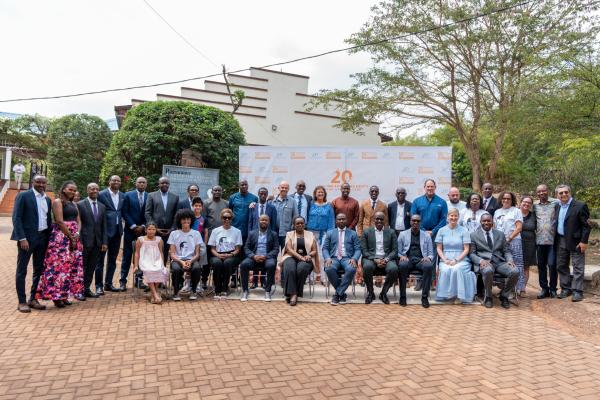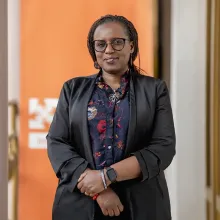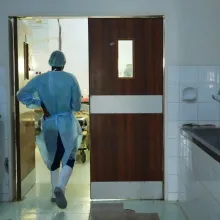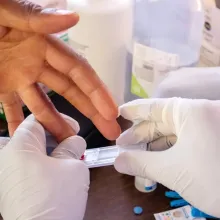Rwinkwavu, Rwanda – July 19, 2025 — The sound of traditional women drummers filled the air as more than 300 guests gathered at the Inshuti Mu Buzima (IMB) campus in Rwinkwavu to celebrate a remarkable milestone: 20 years of Partners In Health Rwanda delivering care, building systems, and transforming lives.
Colorful tents dotted the courtyard, and tables displayed bags, jars of honey, and locally farmed fish—products proudly presented by community members whose livelihoods have been supported through PIH Rwanda’s social and economic accompaniment programs. The celebration was not just a commemoration of the past—it was a living expression of what partnership, equity, and long-term commitment can make possible.
Founded in 2005 at the invitation of the Government of Rwanda, PIH Rwanda—known locally as Inshuti Mu Buzima—has grown from supporting a few rural health centers to becoming a national leader in health system strengthening. Through its work in Kayonza, Kirehe, and Burera districts, PIH now serves over a million people and supports the Ministry of Health in delivering patient-centered care that prioritizes both quality and dignity.
“What makes PIH exceptional for us is not only the quality of clinical care,” said the Governor of Rwanda’s Eastern Province, where PIH began and still maintains its headquarters. “It’s the deep humanity behind every intervention. PIH embodies the true spirit of accompaniment.”
Throughout the day, guests heard testimonies from patients, partners, and staff about how PIH has brought health services closer to rural communities—saving lives, advancing education, and addressing social and economic barriers to care.
Nadine Karema, Executive Director of PIH Rwanda, described the organization’s guiding framework—one built on five pillars: space, systems, staff, stuff, and social support.
“In 20 years, we have built and renovated hospitals, like Kirehe and Butaro, and expanded maternity wards that bring dignity to care,” Karema said. “We’ve equipped facilities with new tools and technologies—like advanced imaging machines and electronic medical records. We’ve trained thousands of health professionals, including more than 5,900 community health workers. And we’ve walked with patients in and beyond the hospital—through home visits, mental health care, and developmental support for children. This is what holistic care looks like. And this is what health equity demands.”
These investments have helped reduce neonatal mortality in PIH-supported districts by more than 40 percent and influenced national protocols that are now shaping care delivery across Rwanda.
Leslie, Chair of the PIH Board of Directors, spoke about the global significance of this journey. “We’ve always worked to meet the immediate needs of patients while also transforming systems, building evidence-based practices, and nurturing a culture of continuous learning,” she said. “None of this would have been possible without the incredible partnership between the Government of Rwanda, IMB, and PIH’s global team. Together, we’ve created a model that is recognized around the world—a model rooted in health equity and human dignity.” That model continues to inspire change beyond the districts where PIH works directly.
The Permanent Secretary of the Ministry of Health praised PIH’s deep engagement at all levels of the system. “PIH works in three districts, but their impact is far beyond,” he said. “We collaborate daily, we share data and evidence, and PIH contributes across platforms to ensure that best practices reach more communities.”
As the celebration drew to a close, the Governor of Eastern Province offered the final words, affirming the profound legacy PIH has built alongside Rwandan institutions and communities—and its responsibility to continue.
“PIH’s work is not only about hospitals and medicine—it’s about people,” he said. “And in that spirit, we know they will keep going. They will build more hospitals, bring in more advanced equipment, train more health workers, and continue to strengthen the systems that ensure no one is left behind.”
Twenty years in, PIH Rwanda is still guided by the same core belief that launched its journey: health is a human right, and care must reach those who need it most—no matter where they live.



